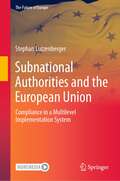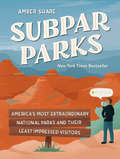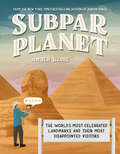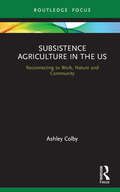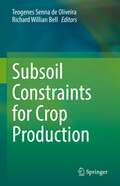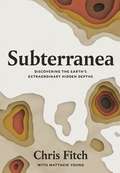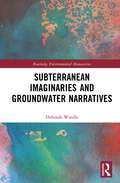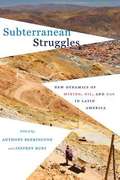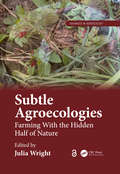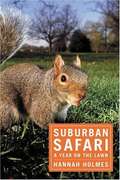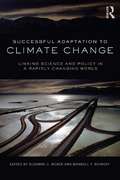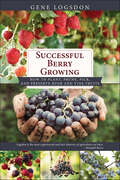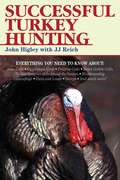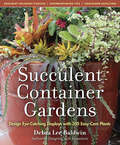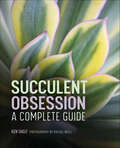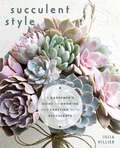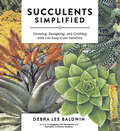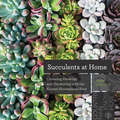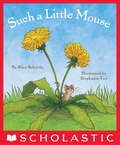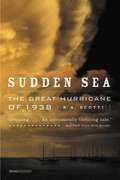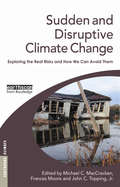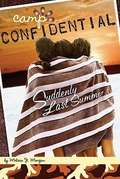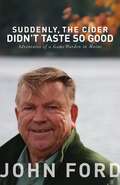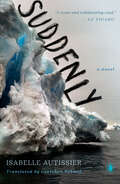- Table View
- List View
Subnational Authorities and the European Union: Compliance in a Multilevel Implementation System (The Future of Europe)
by Stephan LutzenbergerThe European Union, as a regulatory polity based on integration through law, arguably relies more on legal compliance with its policies than any other political system. Proceeding from this point of departure, this book puts the spotlight on the subnational tier and scrutinizes its role in ensuring compliance. Drawing on a dataset of infringement proceedings against federal and regionalized member states, the book shows that strong shared rule, i.e., strong cooperation between national and subnational authorities, can improve national compliance records. In contrast, policy sectors with strong redistributive consequences impair subnational authorities’ capacity to comply. In short, policy and politics matter more than polity.
Subpar Parks: America's Most Extraordinary National Parks and Their Least Impressed Visitors
by Amber Share**A New York Times Bestseller!** Based on the wildly popular Instagram account, Subpar Parks features both the greatest hits and brand-new content, all celebrating the incredible beauty and variety of America&’s national parks juxtaposed with the clueless and hilarious one-star reviews posted by visitors. Subpar Parks, both on the popular Instagram page and in this humorous, informative, and collectible book, combines two things that seem like they might not work together yet somehow harmonize perfectly: beautiful illustrations and informative, amusing text celebrating each national park paired with the one-star reviews disappointed tourists have left online. Millions of visitors each year enjoy Glacier National Park, but for one visitor, it was simply "Too cold for me!" Another saw the mind-boggling vistas of Bryce Canyon as "Too spiky!" Never mind the person who visited the thermal pools at Yellowstone National Park and left thinking, &“Save yourself some money, boil some water at home.&” Featuring more than 50 percent new material, the book will include more depth and insight into the most popular parks, such as Yosemite, Yellowstone, the Grand Canyon, and Acadia National Parks; anecdotes and tips from rangers; and much more about author Amber Share's personal love and connection to the outdoors. Equal parts humor and love for the national parks and the great outdoors, it's the perfect gift for anyone who loves to spend time outside as well as have a good read (and laugh) once they come indoors.
Subpar Planet: The World's Most Celebrated Landmarks and Their Most Disappointed Visitors
by Amber ShareNew York Times bestselling author and illustrator of Subpar Parks Amber Share takes us around the globe to celebrate the world&’s greatest wonders alongside hysterical reviews from their harshest critics.The world is filled with marvels—both natural and human-made— and artist Amber Share has made it her mission to capture the unique majesty of these sites alongside reactions from some of their most vocal visitors. The Dead Sea? &“Who needs burning eyes?&” Who indeed? Big Ben? &“Just a really big clock.&” Go figure. With Share's classic spin on visitors&’ candidly cranky reviews of each location, Subpar Planet fills skeptical travelers with a wanderlust for the world's most spectacular features, including the Eiffel Tower, the Taj Mahal, the Great Barrier Reef, Chichén Itzá, the Sahara, and many more! Equal parts hilarious and informative, Subpar Planet is perfect for seasoned globe-trotters, people interested in broadening their worldly horizons, and anyone who simply wants to see the unique ways their fellow human beings interact with the world around them.
Subsistence Agriculture in the US: Reconnecting to Work, Nature and Community (Routledge-SCORAI Studies in Sustainable Consumption)
by Ashley ColbyFocusing on ethnography and interviews with subsistence food producers, this book explores the resilience, innovation and creativity taking place in subsistence agriculture in America. To date, researchers interested in alternative food networks have often overlooked the somewhat hidden, unorganized population of household food producers. Subsistence Agriculture in the US fills this gap in the existing literature by examining the lived experiences of people taking part in subsistence food production. Over the course of the book, Colby draws on accounts from a broad and diverse network of people who are hunting, fishing, gardening, keeping livestock and gathering and looks in depth at the way in which these practical actions have transformed their relationship to labor and land. She also explores the broader implications of this pro-environmental activity for social change and sustainable futures. With a combination of rigorous academic investigation and engagement with pressing social issues, this book will be of great interest to scholars of sustainable consumption, environmental sociology and social movements.
Subsoil Constraints for Crop Production
by Teogenes Senna de Oliveira Richard Willian BellThis book will address the major subsoil physical and chemical constraints and their implications to crop production; Plant growth is often restricted by adverse physical and chemical properties of subsoils yet these limitations are not revealed by testing surface soils and hence their significance in crop management is often overlooked. The major constraints can be physical or chemical. Physical limitations such as poor/nil subsoil structure, sandy subsoils that do not provide adequate water or gravelly subsoils and, etc. On the other hand, chemical constraints include acidity/alkalinity, high extractable Al or Mn, low nutrient availability, salts, boron toxicity and pyritic subsoils. Some of these constraints are inherent properties of the soil profile while others are induced by crop and soil management practices. This aim of this book is to define the constraints and discuss amelioration practices and benefits for crop production. This book will be of interest to readers involved with agriculture and soil sciences in laboratory, applied or classroom settings.
Subterranea: Discovering the Earth's Extraordinary Hidden Depths
by Chris Fitch'AN ORIGINAL AND TIMELY ODYSSEY INTO OUR MYSTERIOUS UNDERWORLD . . . THRILLING PROOF THAT SCIENCE AND IMAGINATION SHARE THE GROUND BENEATH OUR FEET' Nicholas Crane, presenter of BBC2's Coast and Great British JourneysIf you were to peel back the Earth's surface like an orange, then take a sly peek underneath, what extraordinary things would you see?Subterranea is where the world's remaining mysteries are yet to be found. For millennia, across nations and cultures, it has been a hotbed of fantastical stories. It's where humans have kept their most sacred treasures and their darkest secrets. It's where we have found evidence of our past and may, at some point, find an escape route for our uncertain future. But what would we find there today? From the underground cities of Cappadocia to smuggling tunnels on the US-Mexico border, caves full of tiny blind dragons and a seed vault located 1300km inside the Arctic circle, Subterranea demonstrates that the world below our feet is every bit as vivid and evocative as the world we see around us. Lavishly illustrated and replete with maps and photographs of little-explored locations, Subterranea is the unique, untold and utterly unforgettable story of our planet from the inside.
Subterranean Imaginaries and Groundwater Narratives (Routledge Environmental Humanities)
by Deborah WardleThis book interrogates the problems of how and why largely unseen matter, in this case groundwater, has found limited expression in climate fiction. It explores key considerations for writing groundwater narratives in the Anthropocene. The book investigates a unique selection of climate fiction alongside an exploration of hydrosocial environmental humanities through a focus on groundwater and groundwater narratives. Providing eco-critical analysis, with creative fiction and non-fiction excerpts interwoven throughout, and drawing on Indigenous Australian and Australian settler novels and poems alongside European, American and Japanese texts, the book illuminates the processes of ‘storying with’ subterranean waters – their facts, uncertainties, potencies and vulnerabilities. In a time when the water crisis in an Australian and worldwide context is escalating in response to global warming, giving voice to the complexities of groundwater extraction and pollution is vital. Drawing from non-representational, posthumanist and feminist perspectives, the book provides an important contribution to transnational, comparative climate fiction analysis, enabling an interdisciplinary exchange between hydrogeological science and the eco-humanities. This book is an engaging read for scholars and students in creative writing, environmental humanities, cultural and post-colonial studies, Australian studies, and eco-critical literary studies. Writers and thinkers addressing the problems of the Anthropocene are called to pay attention to the importance of subterranean imaginaries and groundwater narratives.
Subterranean Struggles: New Dynamics of Mining, Oil, and Gas in Latin America
by Anthony Bebbington Jeffrey BuryOver the past two decades, the extraction of nonrenewable resources in Latin America has given rise to many forms of struggle, particularly among disadvantaged populations. The first analytical collection to combine geographical and political ecological approaches to the post-1990s changes in Latin America’s extractive economy, Subterranean Struggles closely examines the factors driving this expansion and the sociopolitical, environmental, and political economic consequences it has wrought. In this analysis, more than a dozen experts explore the many facets of struggles surrounding extraction, from protests in the vicinity of extractive operations to the everyday efforts of excluded residents who try to adapt their livelihoods while industries profoundly impact their lived spaces. The book explores the implications of extractive industry for ideas of nature, region, and nation; “resource nationalism” and environmental governance; conservation, territory, and indigenous livelihoods in the Amazon and Andes; everyday life and livelihood in areas affected by small- and large-scale mining alike; and overall patterns of social mobilization across the region. Arguing that such struggles are an integral part of the new extractive economy in Latin America, the authors document the increasingly conflictive character of these interactions, raising important challenges for theory, for policy, and for social research methodologies. Featuring works by social and natural science authors, this collection offers a broad synthesis of the dynamics of extractive industry whose relevance stretches to regions beyond Latin America.
Subtle Agroecologies: Farming With the Hidden Half of Nature (Advances in Agroecology)
by Julia Wright Nicholas ParrottThis book is about the invisible or subtle nature of food and farming, and also about the nature of existence. Everything that we know (and do not know) about the physical world has a subtle counterpart which has been scarcely considered in modernist farming practice and research. If you think this book isn’t for you, if it appears more important to attend to the pressing physical challenges the world is facing before having the luxury of turning to such subtleties, then think again. For it could be precisely this worldview – the one prioritises the physical-material dimension of reality - that helped get us into this situation in the first place. Perhaps we need a different worldview to get us out? This book makes a foundational contribution to the discipline of Subtle Agroecologies, a nexus of indigenous epistemologies, multidisciplinary advances in wave-based and ethereal studies, and the science of sustainable agriculture. Not a farming system in itself, Subtle Agroecologies superimposes a non-material dimension upon existing, materially-based agroecological farming systems. Bringing together 43 authors from 12 countries and five continents, from the natural and social sciences as well as the arts and humanities, this multi-contributed book introduces the discipline, explaining its relevance and potential contribution to the field of Agroecology. Research into Subtle Agroecologies may be described as the systematic study of the nature of the invisible world as it relates to the practice of agriculture, and to do this through adapting and innovating with research methods, in particular with those of a more embodied nature, with the overall purpose of bringing and maintaining balance and harmony. Such research is an open-minded inquiry, its grounding being the lived experiences of humans working on, and with, the land over several thousand years to the present. By reclaiming and reinterpreting the perennial relationship between humans and nature, the implications would revolutionise agriculture, heralding a new wave of more sustainable farming techniques, changing our whole relationship with nature to one of real collaboration rather than control, and ultimately transforming ourselves.
Suburban Safari
by Hannah HolmesA scientist spends a year in the (suburban) jungle, providing us an intimate look at the critters in our very backyards.
Subway Story
by Julia Sarcone-RoachNever was there a subway car who loved her job more than Jessie. From morning to night she carried all sorts of people all sorts of places--to work and school and World's Fairs, over bridges and through tunnels--sometimes she even took a pigeon along for the ride! But as time passed, sleek new silver cars began to take over the tracks, banishing Jessie to an abandoned lot. What will she do with no passengers to carry? And where will she go now that she's no longer welcome on the tracks?Based on the true story of 1960's-era subway cars that are now being used to create artificial reefs in the Atlantic, this stunningly illustrated second book from Julia Sarcone-Roach is sure to delight scuba diving historians and kids alike.From the Hardcover edition.
Successful Adaptation to Climate Change: Linking Science and Policy in a Rapidly Changing World
by Maxwell T. Boykoff Susanne C. MoserWhat does successful adaptation look like? This is a question we are frequently asked by planners, policy makers and other professionals charged with the task of developing and implementing adaptation strategies. While adaptation is increasingly recognized as an important climate risk management strategy, and on-the-ground adaptation planning activity is becoming more common-place, there is no clear guidance as to what success would look like, what to aim for and how to judge progress. This edited volume makes significant progress toward unpacking the question of successful adaptation, offering both scientifically informed and practice-relevant answers from various sectors and regions of the world. It brings together 18 chapters from leading experts within the field to present careful analyses of different cases and situations, questioning throughout commonly avowed truisms and unspoken assumptions that have pervaded climate adaptation science and practice to date. This book offers not one answer but demonstrates how the question of success in important ways is normative and context specific. It identifies the various dimensions of success, such as economic, political, institutional, ecological, and social, explores the tensions between them, and compiles encouraging evidence that resolutions can be found. The book appraises how climatic and non-climatic stressors play a role, what role science does and can play in adaptation decision making, and how trade-offs and other concerns and priorities shape adaptation planning and implementation on the ground. This is timely interdisciplinary text sheds light on key issues that arise in on-the-ground adaptation to climate change. It bridges the gap between science and practical application of successful adaptation strategies and will be of interest to both students, academics and practitioners.
Successful Berry Growing: How to Plant, Prune, Pick and Preserve Bush and Vine Fruits
by Gene LogsdonA garden without berries is like spring without flowers. But with ever-increasing prices at grocery stores and markets, berries have sadly become a rare treat for most people. Successful Berry Growing is a book to solve this problem for good! A lifelong organic farmer, homesteader and student of everything agricultural, Gene Logsdon knows a thing or two about growing berries. And although Successful Berry Growing is geared to the small-scale or family operation, the information inside is useful for growing berries on any scale. You'll learn how to: Optimize your soil for berry growing Choose the right berry varieties for your climate Properly plant and prune your berry plants Keep your plants healthy and disease-free With detailed information on cultivating strawberries, raspberries, blueberries, blackberries, grapes, currants, gooseberries, cranberries, elderberries, huckleberries and more, Successful Berry Growing is all you need to grow nature's most delicious candy in your own backyard!
Successful Turkey Hunting
by J J Reich John HigleySuccessful Turkey Hunting is based on five years of columns written for the publications of the National Wild Turkey Federation, with a few stories from other publications tossed in the mix. Authors John Higley and J.J. Reich have expanded and updated the articles to fit the format of this book. Included are such subjects as what drives turkey behavior, the importance of calling, how anyone can learn to call, and the part woodsmanship plays. Also included are thoughts on basic equipment and how to deal with a wide range of scenarios encountered while hunting wild turkeys. Featured in many of the columns are such recognized professional turkey hunters as Paul Butski, Ray Eye, Matt Morrett, Alex Rutledge, Eddie Salter, Preston Pittman, Chris Parrish and Mossy Oak's Ronnie "Cuz" Strictland. In articles, seminars, and this book, Higley and Reich have tried to really get into what turkey hunting is all about. It is their hope that these chapters will lead hunters to a better understanding of all phases of turkey hunting, and ultimately result in more successful hunts in spring and fall.
Succulent Container Gardens: Design Eye-Catching Displays with 350 Easy-Care Plants
by Debra Lee BaldwinDefine your individual style. With their colorful leaves, sculptural shapes, and simple care, succulents are beautiful yet forgiving plants for pots. If grown in containers, these dry-climate jewels—which include but are not limited to cacti—can be brought indoors in winter and so can thrive anywhere in the world. In this inspiring compendium, the popular author of Designing with Succulents provides everything beginners and experienced gardeners need to know to create stunning container displays of exceptionally waterwise plants. The extensive palette includes delicate sedums, frilly echeverias, cascading senecios, edgy agaves, and fat-trunked beaucarneas, to name just a few. Easy-to-follow, expert tips explain soil mixes, overwintering, propagation, and more.
Succulent Obsession: A Complete Guide
by Ken ShelfGrow your own successful succulents with this comprehensive guide With an eye-popping variety of species spanning every color of the rainbow, it's no wonder why succulents have exploded in popularity in recent years. Now you can grow your favorite plants with ease thanks to Succulent Obsession. This book is filled with all the expert advice you'll need to identify, care for, and propagate 100 succulents and cacti.What sets this succulent book apart:Complete plant profiles—Get to know the most easy-to-grow succulents with full-color photos and important details about each one's light, soil, and watering requirements.Multiple propagation methods—Expand your succulent garden as you learn how to master a variety of propagation techniques, including using cuttings, leaves, offsets, and division.Handy troubleshooting tips—Discover step-by-step guidance to diagnosing and treating common problems to help your succulents grow and thrive.Whether you care for a single plant or an entire garden, ensure your succulents flourish with this complete grower's guide.
Succulent Style: A Gardener's Guide to Growing and Crafting with Succulents
by Julia HillierThe Ultimate Succulents Book for Gardeners and Crafters#1 New Release in Cacti & Succulents, Ornamental Plants, Gardening, Horticulture, and LandscapeWe know —killing your plants succs. A crash course on all things succulents, this engaging and easy-to-use succulents book offers everything you need to know so you can both successfully grow these gorgeous plants and create cool crafts with them, too. You’ll find everything you need to know from cacti plant care to specific projects for decorating with plants.A go-to reference for anyone trying to grow and maintain succulents. The ultimate guide to propagating, growing, and styling succulents and cacti both indoors and out, Succulent Style is as informative as it is gorgeous. Designed for millennials who want to stop killing their plants and for DIY types who want to learn about designing with succulents, Succulent Style is full of succulent growing techniques for beginners as well as for knowledgeable gardeners looking to expand their gardening skills. This beautifully photographed compendium makes the perfect addition to any coffee table or bookshelf.Succulent ideas for your home and garden. Whether you want to learn how to care for a cactus indoor or how to style plants, you’ll find tons of tips and tricks inside. Start designing succulents with fun projects like succulent garlands, wall art, wreaths, succulent bouquets, potted arrangements as well as many other cool things.Inside, you’ll also find:A detailed compilation of succulent varietiesInstructions on how to propagate and plant cacti and succulentsTips to integrate succulents into outdoor and indoor designIf you’re looking for a succulents plants book or cactus book —like A Beginner's Guide to Succulent Gardening, Essential Succulents, The Gardener's Guide to Succulents, or Cacti and Succulents Handbook —then you’ll love Succulent Style.
Succulents Simplified: Growing, Designing, and Crafting with 100 Easy-Care Varieties
by Debra Lee BaldwinSucculents are hot. And Debra Lee Baldwin, the bestselling author of Designing with Succulents and Succulent Container Gardens, is the ideal guide for gardeners, crafters, and DIYers looking for an introduction to these trendy, low-maintenance, drought-tolerant plants. Along with gorgeous photos packed with design ideas, Debra offers her top 100 plant picks and explains how to grow and care for succulents no matter where you live. Step-by-step projects, including a cake-stand centerpiece, special-occasion bouquets, a vertical garden, and a succulent topiary sphere, will inspire you to express your individual style. Whether you’re a novice or veteran, have an acre to fill or a few pots, live in Calexico or Canada, Succulents Simplified is a dazzling primer for success with succulents wherever you live!
Succulents at Home: Choosing, Growing, And Decorating With The Easiest Houseplants Ever
by John TullockGrow happy, healthy succulents Succulents have become some of the most popular houseplants, and with good reason: they’re easy to grow…most of the time. But what happens when a plant outgrows its pot? Did you know succulents can get sunburned? How do you turn one plant into more plants? In Succulents at Home, expert gardener John Tullock addresses these questions and many more. Here, readers will learn to make the most of their plants from the how and why of soil and container choice to step-by-step instructions for repotting, propagating new succulents, and creating arrangements like terrariums and wreaths. The book is complete with a catalog of 75 species—flower-shaped echeverias, pointy haworthias, flowering kalanchoes, round mammillaria cacti, and more—which explains special care instructions for each variety. Tullock’s friendly voice and years of experience, and more than 100 color photographs, make this a must-have guide for fool-proof succulent gardening. And with a focus on growing succulents to enjoy indoors, this is a book for plant lovers in all regions and climates.
Such a Little Mouse
by Alice SchertleExplore the world of such a little mouse--from the bestselling author of LITTLE BLUE TRUCK!"And way down deep in the holelives a mouse.Such a little mouse,with his smart gray coat,with his ears pink as petals,with three twitchety whiskerson each side of his nose."With Alice Schertle's sweet descriptive language and touching illustrations from Stephanie Yue, a little mouse interacts with the world around him. Every season of the year, "such a little mouse" pops out of his hole and goes out to explore the wider world.
Sudden Sea: The Great Hurricane of 1938
by R. A. ScottiThis spellbinding narrative, focusing on the extraordinary human drama that unfolded as an unlikely alignment of meteorological conditions conspired to bring a deadly tropical cyclone to the Northeast in the summer of 1938, summons back the most ferocious storm ever to hit the East Coast. It was a natural disaster so intense that it indelibly marked not only the lives of families across seven states but also the land itself, requiring the entire coastline map of New England to be redrawn.
Sudden and Disruptive Climate Change: Exploring the Real Risks and How We Can Avoid Them (Earthscan Climate Ser.)
by Michael C. MacCracken Frances Moore John C. Topping'An impressive accomplishment. Al Gore, Former Vice President of the US, co-recipient of the 2007 Nobel Peace Prize, and author of An Inconvenient Truth Offers positive solutions that no rational person, organization or government can ignore - except at their peril. Stephen H. Schneider, Professor for Interdisciplinary Environmental Studies, Stanford University, and author of The Genesis Strategy: Climate and Global Survival The science is clear and the message of this book is that there is no more time for delay. Rosina M. Bierbaum, Dean, University of Michigan While changes in emissions and atmospheric concentrations of greenhouse gases are projected to be slow and smooth, the intensity and impacts of climate change on the environment and society could be abrupt and erratic. Surprising and nonlinear responses are likely to occur as warming exceeds certain thresholds, inducing relatively rapid and disruptive changes in the Greenland and West Antarctic ice sheets, precipitation intensity and patterns, coastal inundation, the occurrence of wildfire, the ranges of plant and animal species and more. Written by a transdisciplinary group of internationally respected researchers, this book explores the possibilities of such changes, their significance for society and efforts to move more rapidly to limit climate change than current government measures.
Suddenly Last Summer (Camp Confidential #20)
by Melissa J. MorganIn this tearful conclusion to the series, Dr. Steve announces that the government has forced him to sell the campgrounds to the state. The girls are heartbroken?until they decide to take a stand.<P><P> They gather a group and head to the state capital to protest on the camp?s behalf, replete with signs, chants, and plenty of determination. Will the girls? plan work, or will this be the last summer they?re all together?
Suddenly, the Cider Didn't Taste So Good: Adventures of a Game Warden in Maine
by John FordRetired Maine Game Warden John Ford has seen it all. He's been shot at by desperate prison escapees, been outwitted by wily trappers, and rescued scores of animals. <p><p> As a tenacious and successful warden, he was always willing to spend the time needed to nab violators of the state's fish and game laws. At the same time, though, he wasn't a cold, heartless, go-by-the-book enforcer; he usually had a good quip ready when he slipped the handcuffs on a violator, and he wasn't above accepting a lesson learned as sufficient penalty for breaking the law. <p><p> Ford is also a very gifted storyteller and he writes of his adventures in Suddenly, the Cider Didn't Taste So Good, a collection of true tales, both humorous and serious, from the trenches of law enforcement, and also includes heartwarming accounts of his rescue of hurt or abandoned animals.
Suddenly: A Novel
by Isabelle AutissierIn a gripping story of survival set against the stark backdrop of the Antarctic Ocean, a couple shipwrecked on an island must trust each other with their livesA young couple from Paris sets out on the adventure of a lifetime: a journey by sailboat around the tip of Cape Horn. But when they stop on a deserted island to explore the barren landscape, the unthinkable happens and they find themselves stranded. Unprepared to survive in the harsh conditions on the island, their only supplies from an abandoned research station, the two must depend on each other as they never have in their lives to hold on until rescue comes, if it ever arrives at all.A stunning, harrowing tale of survival from an expert in sailing and the natural world, Suddenly tells the story of the people we become when faced with the daunting and awesome power of the natural world, and what happens to those who live through such experiences.
